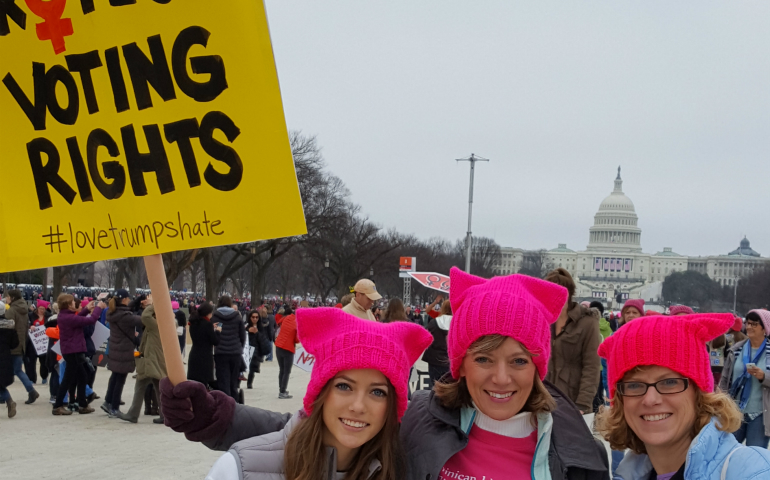
Heidi Schlumpf, right, with others who marched to protect voting rights, among other things. (Provided photo)
As a writing teacher, I often remind students that they must first figure out what they want to say before attempting to write; otherwise their writing lacks focus. That same criticism could have been made about last weekend's Women's March on Washington and the more than 500 "sister marches" held in cities around the United States and the world.
That criticism, however, would be wrong. In fact, the diversity of the issues that led women — and men — to take the streets on Jan. 21 was its greatest strength.
Originally organized as a reaction to the election of Donald Trump, the march quickly became mired in controversy for its lack of focus. Some said just being "anti-Trump" wasn't enough; others argued that the march wasn't diverse enough, racially and otherwise.
The rally's mission and vision to stand in solidarity "for the protection of our rights, our safety, our health and our families" — was broad enough to include pretty much everyone. Its "guiding principles," as listed on the website, were Martin Luther King's five principles of nonviolence. Only later were the eight "unity principles," which included reproductive rights, added.
That, combined with pro-choice sponsors and partners joining the leadership, led some pro-lifers to believe they weren't welcome. It didn't help that march organizers seemed to require official partners to accept the unity principles, dropping one pro-life sponsor who made it clear they did not.
But prolife folks were welcome to march, and many — including communities of women religious — did.
The number of issues portrayed on marchers' signs was staggering: feminism, the environment, immigrants' rights, war and peace, voting rights, equal pay for equal work, funding for the arts, free speech, marriage equality, health care, opposition to a Muslim registry, Black Lives Matter, Russian interference in the U.S. election and, of course, plenty of displeasure about the man whose inauguration was held the day before the march.
One sign summed it up: "So many issues. So little sign."
But rather than make the march diffuse and ineffective, this breadth was the source of what made it so effective: its size. The news of the march — and my experience on the ground in D.C. — was about its massiveness: perhaps more than 3 million people worldwide.
That such a huge mass of folks came together is actually quite astounding — and, for those of who tend toward despair — downright encouraging. That the Washington march, with at least 500,000 and possible upwards of 1 million — happened without any arrests is evidence that love really does trump hate.
I, for one, didn't need to agree with every person at the rally to join with them to oppose the direction of political leadership from the last election. This is not the normal transfer of power from one party to another; this is something much more serious: a move away from the very principles of democracy and freedom upon which our country was founded.
Before the election, divisiveness and hatred was the order of the day. As of this weekend, Bernie Sanders and Hillary Clinton supporters — as well some non-voters and even those who voted Republican but not Trump — are working together.
The Women's March was not perfect, and I respect those who are criticizing it to make it better. But to unify that many people in a spirit of love and hope — especially in these times — is a pretty amazing accomplishment. E pluribus unum.
[Heidi Schlumpf teaches communications at Aurora University and is the author of Elizabeth Johnson: Questing for God.]




